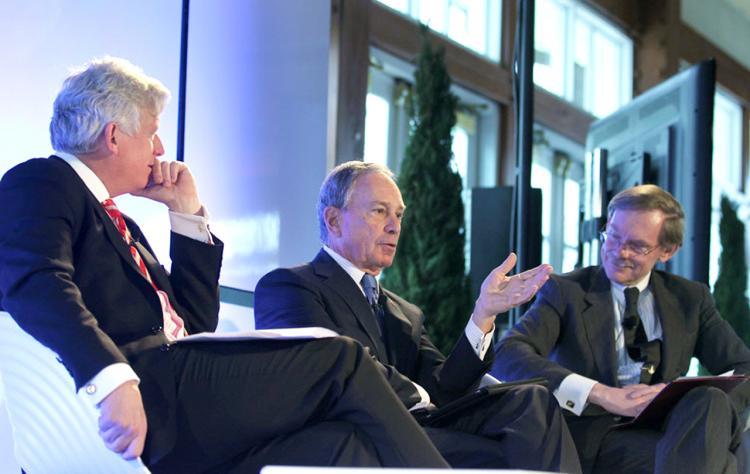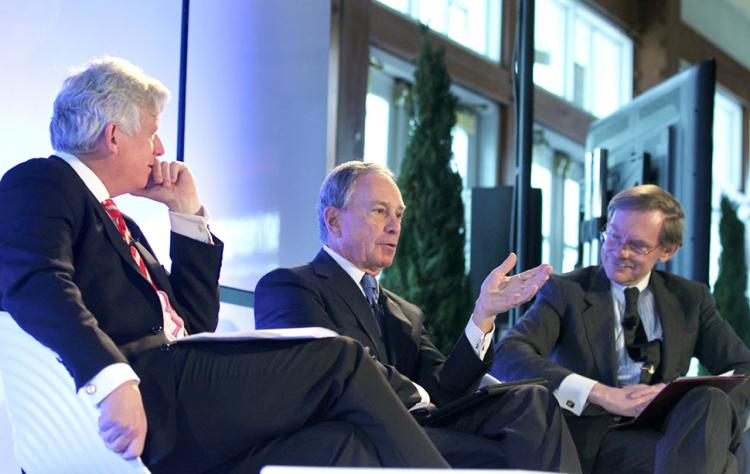NEW YORK—Clean, affordable, and efficient energy is indispensible for the prosperity of the world, and big cities may be the best place to start. Mayor Michael Bloomberg joined World Bank President Robert Zoellick on the fourth day of the Bloomberg New Energy Finance Summit (BNEF) in a panel discussion on a city-centered perspective of energy and climate change.
More than 200 participants attended the event, which was hosted in association with UN-Energy. David Miller, former mayor of Toronto and former chair of Large Cities Climate Leadership Group (C40), moderated the panel discussion.
“In history, most people lived in urban areas,” said Miller, offering a rationale on the need to focus on cities when addressing climate change and energy issues.
Other speakers supported this stance. “If you are going to deal with green house gases, or energy in other issues, you’d start with the urban areas,” said Zoellick.
Over 50 percent of people live in cities, and the number is growing. According to Bloomberg, who is the current chair of the C40, 70 percent of the greenhouse gases come from cities.
The C40, a coalition of 40 large cities, was established in 2006 to cooperate on energy and climate change issues.
“The problem really is a city problem. The damage to people’s lungs and the impact on our economy and where the actual problems are being created are in the big cities of the world,” said Bloomberg. Many of the previous global efforts went to agriculture and forestry, drilling for oil, mining coal, or activities that occur outside of cities, he added.
The discussion began with Miller asking the speakers what the C40 cities have done, together or separately, to fight climate change.
“There are two things C40 can do,” stated Bloomberg. “It is sharing best practices, and it is helping each other do things that are specific to their cities.”
Each city has responded to the challenge differently, he noted, alluding to New York City’s issues, and drawing examples from other cities around the world, such as Sao Paulo, Jakarta, and Mexico City.
“New York is very different from lots of other cities. Our big problem is buildings. Because of New York’s density, our reliance [is] on either walking or taking mass transit. … Eighty percent of our pollution comes from buildings, and 20 percent comes from transportation,” said the mayor.
Reducing the energy consumption in buildings and cleaning up the air pollution resulting from air conditioning and heating systems were cited as measures the city could take to address energy and climate change issues.
“We can all learn from each other. New York City has an awful lot to learn from the rest of the world,” said Bloomberg.
When asked about the role of the World Bank in supporting cities, Zoellick stated that the bank handles a significant amount of lending that goes to urban projects. “Last year, it was about $5.6 billion, a lot of those are connected to energy and green house gas issues,” he said.
The real promise of the World Bank’s role in working with cities is to connect knowledge with information and experienced people with innovative financing, as well as to leverage knowledge with people of different capabilities, said Zoellick. Another role of the bank is to manage the risk, he added.
Speakers offered advice and suggestions on how banks and cities could work more closely together to overcome the challenges of energy and climate change.
“To be able to tap some of the larger sources of public financing, you have to have some way of measuring what you are doing. You have to have some sense of metrics. If you cannot measure what you are doing, you are not going to go too far,” noted Zoellick.
There is also a need to facilitate action, participation, and investment from the private sector. The World Bank can assist with one-time projects, help people design programs to get there, and to explore ways to attract private capital—because “public money only takes you so far,” said Zoellick.
“After 10 years of being a mayor, I guess my conclusion is you will never see government at federal level or the state level take the lead and make the difficult decision,” noted Bloomberg
The drive has to come from two parts—either from mayors who have to answer to the public every day or from people who come with the data prepared, said Bloomberg. The impact has to be immediate with relatively short-term goals, he added.
“If you want to improve the environment, it is the air you breathe today. It’s the hospital visit your kid has to go to for asthma. It’s the water that it’s polluting. It’s got to be the money you can save, your energy bill in your home or in your company, or the opportunity you have to sell new products,” Bloomberg said.
More than 200 participants attended the event, which was hosted in association with UN-Energy. David Miller, former mayor of Toronto and former chair of Large Cities Climate Leadership Group (C40), moderated the panel discussion.
“In history, most people lived in urban areas,” said Miller, offering a rationale on the need to focus on cities when addressing climate change and energy issues.
Other speakers supported this stance. “If you are going to deal with green house gases, or energy in other issues, you’d start with the urban areas,” said Zoellick.
Over 50 percent of people live in cities, and the number is growing. According to Bloomberg, who is the current chair of the C40, 70 percent of the greenhouse gases come from cities.
The C40, a coalition of 40 large cities, was established in 2006 to cooperate on energy and climate change issues.
“The problem really is a city problem. The damage to people’s lungs and the impact on our economy and where the actual problems are being created are in the big cities of the world,” said Bloomberg. Many of the previous global efforts went to agriculture and forestry, drilling for oil, mining coal, or activities that occur outside of cities, he added.
The discussion began with Miller asking the speakers what the C40 cities have done, together or separately, to fight climate change.
“There are two things C40 can do,” stated Bloomberg. “It is sharing best practices, and it is helping each other do things that are specific to their cities.”
Each city has responded to the challenge differently, he noted, alluding to New York City’s issues, and drawing examples from other cities around the world, such as Sao Paulo, Jakarta, and Mexico City.
“New York is very different from lots of other cities. Our big problem is buildings. Because of New York’s density, our reliance [is] on either walking or taking mass transit. … Eighty percent of our pollution comes from buildings, and 20 percent comes from transportation,” said the mayor.
Reducing the energy consumption in buildings and cleaning up the air pollution resulting from air conditioning and heating systems were cited as measures the city could take to address energy and climate change issues.
“We can all learn from each other. New York City has an awful lot to learn from the rest of the world,” said Bloomberg.
When asked about the role of the World Bank in supporting cities, Zoellick stated that the bank handles a significant amount of lending that goes to urban projects. “Last year, it was about $5.6 billion, a lot of those are connected to energy and green house gas issues,” he said.
The real promise of the World Bank’s role in working with cities is to connect knowledge with information and experienced people with innovative financing, as well as to leverage knowledge with people of different capabilities, said Zoellick. Another role of the bank is to manage the risk, he added.
Speakers offered advice and suggestions on how banks and cities could work more closely together to overcome the challenges of energy and climate change.
“To be able to tap some of the larger sources of public financing, you have to have some way of measuring what you are doing. You have to have some sense of metrics. If you cannot measure what you are doing, you are not going to go too far,” noted Zoellick.
There is also a need to facilitate action, participation, and investment from the private sector. The World Bank can assist with one-time projects, help people design programs to get there, and to explore ways to attract private capital—because “public money only takes you so far,” said Zoellick.
“After 10 years of being a mayor, I guess my conclusion is you will never see government at federal level or the state level take the lead and make the difficult decision,” noted Bloomberg
The drive has to come from two parts—either from mayors who have to answer to the public every day or from people who come with the data prepared, said Bloomberg. The impact has to be immediate with relatively short-term goals, he added.
“If you want to improve the environment, it is the air you breathe today. It’s the hospital visit your kid has to go to for asthma. It’s the water that it’s polluting. It’s got to be the money you can save, your energy bill in your home or in your company, or the opportunity you have to sell new products,” Bloomberg said.






